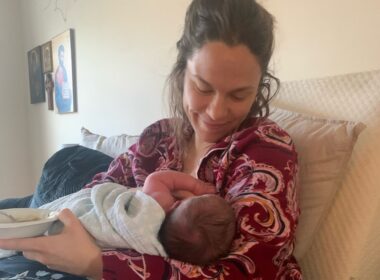Nearly a decade ago, I came across Holly Grigg Spall’s work. I had just had a transformational “aha” moment myself, gotten off the pill, and started my own journey using a Fertility Awareness method. Grigg Spall was in the process of publishing Sweetening the Pill, which at the time was a groundbreaking and radical book. Not many secular voices were critically asking questions about hormonal birth control. Grigg Spall, among others, forged a valuable path—one that begged for unity.
She declared it was time for everyone, regardless of political sway or religious beliefs, to ask critical questions about hormonal contraception. The verdict can no longer be ignored. Science has proven that artificial hormones can cause harm to women. These women’s voices deserve to be heard and there is a solution: comprehensive fertility education.
After Sweetening the Pill was published in 2013, it was soon bought by filmmakers Abby Epstein and Ricki Lake, who made waves with their “The Business of Being Born” documentary in 2008. It was a natural and no brainer move. After much anticipation (and surely a lot of hard work and love), “The Business of Birth Control” was released at the Doc NYC fest this fall and made available for streaming nationwide. I was giddy to watch such a long-awaited movie.
The “main characters” of the doc are grieving parents who have lost their daughters to fatal side effects of hormonal birth control and a dynamic duo: nurse Kelsey Knight and doula Emily Varnam, who co-wrote “The Fifth Vital Sign,” a women’s reproductive health course. There are other important voices peppered throughout the movie, like Aviva Romm, Latham Thomas, Lisa Hendrickson Jack, Jolene Brighton, Lara Briden.
What worked
The film starts with a quick history lesson about how hormonal birth control came on the scene and became so ubiquitous. They don’t shy away from talking about the sordid history of Planned Parenthood, the organization’s ties to eugenics, and the Puerto Rican women who died during the trials that gave drug companies permission to release the pill for wide scale use. Epstein and Lake successfully captured the nuances of why criticizing the pill doesn’t necessitate criticizing women’s rights.
Most notably, the film has a diverse cast and gave voice where it was needed. Because of contraception’s horrific roots in eugenics, black women have a different vantage point when it comes to the issue. Considering the shocking racial disparities in maternal and infant care in America, and the overwhelming lack of people of color care providers, it makes sense why nonwhite women experience their doctor’s office a little differently. Lake and Epstein didn’t shy away from making sure these women’s stories are told.
After introducing the history of the pill and establishing the problems with it, the film takes a different turn. They introduce two separate families who lost their young, healthy daughters to cardiac arrest from their birth control. Rick and Karen Langhart, parents of Erika Langhart, recount their story of the shattering Thanksgiving day in 2011 when they lost their 24-year -old daughter to the NuvaRing. Their story is heartbreaking and gives the viewer a bit of a personal gut check. Dana and Joe Malone tell their eerily similar story of losing their daughter, Brittany Malone. Joe pleads, helplessly, to the FDA: “But my daughter died. Don’t you care?” The women who lose their life to birth control side effects seem minute when it’s just a number—but when you put a face and a family behind that number, it drills the point home in a different way.
Thankfully, the film doesn’t hang too long here, lest the viewer get downtrodden. Insert Kelsey Knight and Emily Varnam of “The Fifth Vital Sign.” They are part of a growing movement (one that we at Natural Womanhood are no stranger to!) that emphasizes teaching women to know their cycles, chart their fertility biomarkers, and have access to comprehensive health care that treats and diagnoses cycle issues. There’s an endearing scene where Kelsey and Emily explain Fertility Awareness to the Boomer parents and explain their educational approach.
“We don’t address doctors, we address women directly. We focus on the idea of friendship because that’s where women make these kinds of decisions. I want to get there first. I want to talk to women before they’re at the doctor’s office. Because I’m trying to win. I’m serious. What’s happened to your kids, it can’t happen anymore.”
Kelsey and Emily teach some of the sex ed information the parents themselves didn’t learn 40 years ago. They even share a chuckle as one of the dads mentions using a dental dam—in dental school, of course.
Without this critical correspondence, the film could have taken an entirely different turn. It could have been a doom and gloom, Diane Sawyer-esque exposé about all the bad things hormonal contraception can cause. But by presenting an alternative, this gave a complete picture—one of optimism. It asks women to aspire to something different, more autonomous, actual health care. The film ends with an introduction to Felicity Yost and Carolyn Witte, co-creators of Tia Health, an NYC-based collaborative care startup that hopes to put women in the driver’s seat of their doctors’ appointments.
What was left out
Left out the LARCs (Long-Active Reversible Contraception)
The film focused largely on the pill and NuvaRing. As someone who writes, works, reads, and researches hormones for a living, I know that other forms of hormonal contraception like the IUD, implant, and shot are hardly different from all the formulations of the pill. But the lay person might not know that. LARCs are quickly rising to the top as a popular choice for birth control. In fact, 10% of women are now using them compared to less than 3% in 2002.
Without a solid segment on IUDs and other LARCS, I fear the film may leave a viewer to think that LARCs could be part of the shiny future of healthcare when women are subject to just as many—if not more—side effects (spanning from irritating to fatal) while using an IUD or LARC. In many ways, the LARCs are just the pill in new clothing—and I don’t know that the documentary made that entirely clear.
Nonfatal yet serious side effects
DVT (deep vein thrombosis) is serious and devastating, and an estimated 300-400 US women die yearly from birth control-related blood clots that lead to stroke, pulmonary embolisms, and heart attacks. But many other risks could have been emphasized, such as breast and cervical cancer or auto-immune diseases as well as the far more common side-effects for women on hormonal contraception, such as digestive issues, altered neural pathways, bone mineral loss, depression, lowered libido, cervical crypt changes, migraines, insomnia, panic attacks, and anxiety.
Compared to fatal DVT or cancer, these side effects sound nominal. But even these humble side effects should not be considered “just the price women pay.” The film didn’t completely gloss over them, but I feel that they could have covered more extensively some of these nonfatal, but serious side effects. (Basically, I wanted to see more of Sarah E. Hill—I’m a big fan.)
Overall, “The Business of Birth Control” ticked all the boxes for me. Epstein and Lake used powerful voices to tell important stories from many different viewpoints, largely kept out of the political fray to focus on the issue at hand, and utilized a nice array of historical, authentic situations, and interview footage.
This is an issue we at Natural Womanhood are so passionate about that we have drafted a petition to the FDA to remove these drugs from the market to protect women’s health. If you haven’t already signed it, please do so. We’re hoping to get 25,000 signatures! Make sure your name is one of them!
Stray Observations
-Hey! Did you catch a glimpse of our very own CEO, Gerard Migeon, at the Contraceptive Conundrum Conference segment?
-I was at that Cycles and Sex event! (But no cameo for me.)
-How rad was the house belonging to Dr. Hubertus Rechberg, inventor and founder of Lady Comp?
-Loved seeing THE Alice Wolfson of the Nelson Pill Hearings—51 years later!
Additional Reading
17-year-old ballerina’s death attributed to the pill
New research on birth control and blood clots reveals real risk factors
FDA Citizen’s Petition on Birth Control: Shocking Stories of How Women Are Getting Hurt
10 Reasons to Consider Getting off Birth Control and Starting Fertility Awareness Instead
What does it cost to learn natural birth control, FAM, or NFP?







